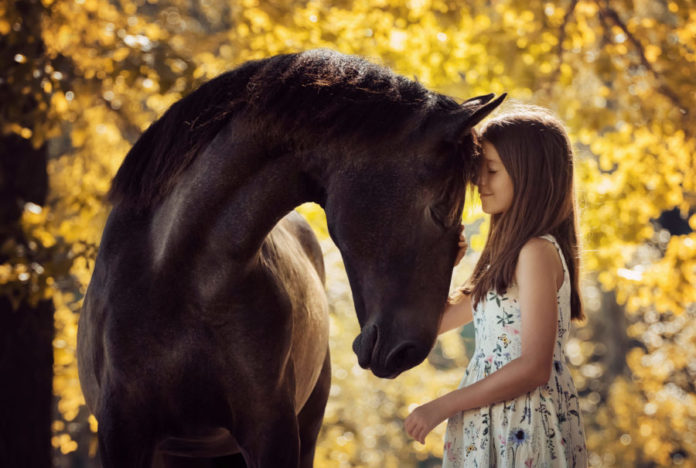(as appeared in the December 5th online issue of Equine Wellness Magazine
https://equinewellnessmagazine.com/finding-a-voice/)

This is the story of Anna, a little girl with selective mutism who found strength and support within the herd.
As a family wellness practitioner, I work with children, families and individuals to provide soulful interventions rooted in nature. My goal is to assist with personal growth and help people face the stresses and challenges that life may bring.
A while ago, I had the privilege of working with a unique little girl named Anna. She had a pleasant but quiet personality. In fact, she was extremely shy and had developed a pattern of selective mutism at school. Anna had an older sibling with special needs and significant behavioural issues that often disrupted life for everyone at home. Upon further investigation, it was suspected that Anna’s selective mutism was likely related to difficulty coping with her stressful circumstances at home.
The anticipatory anxiety of being stuck in these situations – and other highly sensory-stimulating environments – compromised Anna’s ability to navigate social situations. Over time, it had led her to use the protective mechanism of staying quiet. Although her parents were doing everything right, they lived with the guilt of not being able to “fix” everything – they couldn’t change the fact that their family life was complicated. Anna inherently knew this and unconsciously tried to ease the chronically strenuous load from her parents by playing the role of the “easy” child and becoming almost invisible.
As a student in the first grade, Anna was successful academically. But it became apparent that she needed support to help her make sense of her emotions and develop strategies to thrive socially. Her parents had tried traditional therapy, but nothing seemed effective. That’s when they reached out to me.
When I first met Anna, I could tell she possessed a certain maturity and emotional intelligence beyond her years. I had observed this in children with selective mutism before – to me, this presented as an admirable inner strength. At our first meeting, she was able to speak with me immediately, but it became obvious that she had adopted the role of the “pleaser”. While she answered questions politely, she did not share beyond what was being directly asked of her. This was a concern, as I suspected it reflected her tendency to cope by bottling up her feelings.
I determined that we would have to address core issues at the family systems level, develop support strategies for her teachers and offer one on one sessions in order to help Anna find her own unique voice. To begin breaking down the thick walls she had built around her sensitive heart, it was going to require some serious horsepower. So what did I do? I brought in the horses.
When we first entered the pasture, Anna’s eyes gleamed with pure excitement and awe. She had been around horses before but had never been invited to simply walk freely among a herd. This particular domestic herd was a mix of geldings and mares – some who were pregnant. It did not surprise me one bit that the horses were immediately drawn to her beautiful energy. What happened next was truly magical.
The pregnant mares surrounded this little girl in a circle of motherly protection and comfort. The rest of the herd seemed to understand the intent of the pregnant mares and kept a respectful distance, acknowledging that this little girl had become their charge. The leader of the pregnant mares moved toward Anna, positioning herself directly in front of her. She then proceeded to breathe rhythmically over her head. Anna understood that she needed to remain still.
Instinctively, both girl and horse closed their eyes and seemed to follow a synchronized breathing pattern, which took on a peaceful meditative quality. The other mares appeared to simply hold the space and remained perfectly still for at least 20 minutes. You could practically feel the energy slowly chipping away at the walls surrounding the little girl’s heart.
According to Anna’s parents, she slept in the car all the way home. The emotional effects of Anna’s initial visit with the horses proved to be the groundbreaking beginning of her journey toward wellness. In the following months, Anna was enthusiastic. She begged her parents to allow her to continue her visits with the horses. As our sessions progressed, we were able to benefit from the profoundly grounding and centering experience with the horses and begin to tackle the core underlying issues surrounding her selective mutism.
These experiences began to serve as a type of emotional warm-up for Anna – a catalyst for her to engage in self-reflection and free expression. After each session with the horses, we would follow-up with creative mediums (mostly art) to visually reflect a new-found awareness around relevant themes such as confidence, worthiness, safety, roles and relationships. We made a point of being outdoors as much as possible for this, in the hope of instilling a sense of natural discovery and an awareness of being part of something much larger than ourselves (and our problems). Her parents commented on how Anna looked forward to her sessions, which had not been the case with previous interventions they had tried.
In scientific literature, it is well documented that we are all somewhat “nature-deficient” – the way we are forced to adopt certain lifestyles due to jobs or other circumstances removes us from the natural world. We now know, however, that spending meaningful time in nature can alleviate stress, and anxiety, as well as improve our moods and overall sense of well-being. But in order for your experiences with nature to be truly effective, they must reach you on a soul level. In fact, research suggests that when any health issue is addressed by incorporating the person’s sense of spirituality or soulful beliefs, they are more successful at making lasting changes.
It was only after a carefully orchestrated process that we were able to lay a foundation for introducing coping strategies into Anna’s life. Progress did not happen overnight and was not restricted to my intervention, but her parents soon began to observe their daughter applying these coping strategies in her life with success. By mid-year, she was no longer mute at school.
While working with this family, it was not possible to change difficult life circumstances. But with the help of her family, friends, and teachers, I managed to teach Anna the importance of tending to her own wellness in a way that was pleasant, meaningful, and easy to apply. In this case, I believe we have the horses to thank for that.
For more information visit, www.mariannedisipio.com

